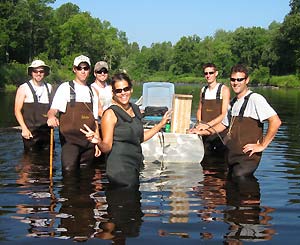
Interns working for the Minnesota Pollution Control Agency (PCA). Each summer, the PCA hires student interns for biological monitoring of streams and wetlands.
(Source: http://www.pca.state.mn.us)
If you’re working and earning money this summer, then welcome to the world of being a taxpayer. Whether you’re an employee getting a paycheck (such as lifeguarding or waiting tables), or working for yourself (for example babysitting or cutting grass), it’s good to know some basics on paying taxes. Here’s some useful information for you, courtesy of the IRS:
Tax Tips for Students with Summer Jobs
Students often get a job in the summer. If it’s your first job it gives you a chance to learn about work and paying tax. The tax you pay supports your home town, your state and our nation. The following are some tips students should know about summer jobs and taxes.
- Withholding and Estimated Tax. If you are an employee, your employer withholds tax from your paychecks. If you are self-employed, you may have to pay estimated tax directly to the IRS on set dates during the year. This is how our pay-as-you-go tax system works.
- New Employees. When you get a new job, you will need to fill out a Form W-4, Employee’s Withholding Allowance Certificate. Employers use it to figure how much federal income tax to withhold from your pay. The Withholding Calculator tool on IRS.gov can help you fill out the form.
- Self-Employment. Money you earn doing work for others is taxable. Some work you do may count as self-employment. These can be jobs like baby-sitting or lawn care. Keep good records of your income and expenses related to your work. You may be able to deduct (subtract) those costs from your income on your tax return. A deduction can cut taxes.
- Tip Income. All tip income is taxable. Keep a daily log to report them. You must report $20 or more in cash tips in any one month to your employer. And you must report all of your yearly tips on your tax return.
- Payroll Taxes. You may earn too little from your summer job to owe income tax. But your employer usually must withhold social security and Medicare taxes from your pay. If you’re self-employed, you may have to pay them yourself. They count for your coverage under the Social Security system.
- Newspaper Carriers. Special rules apply to a newspaper carrier or distributor. If you meet certain conditions, you are self-employed. If you do not meet those conditions, and are under age 18, you may be exempt from social security and Medicare taxes.
- ROTC Pay. If you’re in ROTC, active duty pay, such as pay you get for summer camp, is taxable. A subsistence allowance you get while in advanced training is not taxable.
- Use IRS Free File. You can prepare and e-file your tax return for free using IRS Free File, available on IRS.gov. You may not earn enough money to be required to file a federal tax return. Even if that is true, you may still want to file. For example, if your employer withheld income tax from your pay, you will have to file a return to get a tax refund.
Additional IRS Resources:
- Student’s Page – High School
- Student’s Page – Higher Education
IRS YouTube Videos:



